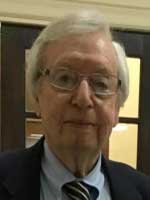Scientific Meeting: The Aging Analyst
Event Phone: 212-879-6900
-
September 12, 2024
8:00 pm - 10:00 pm
***This meeting is virtual and will be held on ZOOM.***
NYPSI’s 1074th Scientific Meeting:
“The Aging Analyst”
Tuesday, September 10, 2024
Date has been changed to Thursday, September 12, 2024
8:00 – 10:00 PM (EST)
Presenter: Judy Kantrowitz, Ph.D.
Discussant: Alexander Kalogerakis, M.D.
This meeting will address the concept of resiliency within the framework of telephone interviews undertaken by Dr. Judy Kantrowitz with some fifty analysts between the ages of 70 and 92 who were still treating patients at the time. Dr. Kantrowitz will explore the reasons given by those interviewed (twice in the case of some 35 of them) for becoming analysts and what the interviews reveal of the work life, plans for the future, satisfactions, regrets, and thoughts about time of the elderly analyst. What do older analysts wish to pass on to future analysts? How do older analysts see the state of the psychoanalytic field, feel about “lifers,” and consider their own state of health? Those interviewed have not all been without significant illness and personal loss. What contributes to their resiliency? These are among the questions to be addressed in this meeting.
2 Contact Hours. 2 CME/CE credits will be offered. See details below.
General Admission: $50
Student Admission: $35
Free Admission for current NYPSI members/students and HFI Candidates
Please note registration closes at 5 PM on Wednesday, September 11.
THIS MEETING IS VIRTUAL; READ INSTRUCTIONS TO ENSURE SUCCESSFUL REGISTRATION:
1. Buy your ticket at REGISTRATION LINK above.
2. After you register, you will receive a confirmation email containing a link to Pre-Register in ZOOM for the event.
3. Click on the pre-registration ZOOM link and enter your name and email address. If you do not complete this step, you will NOT receive link to meeting.
4. After completing ZOOM pre-registration, you will automatically receive an email directly from ZOOM containing the JOIN LINK to the meeting. Click the JOIN LINK to “enter” the meeting.
5. Evaluation Survey and CME/CE documentation will be emailed the day after the event.
Please make sure you type your email correctly when you register! Contact with questions.
1. Olesker, W., Blum, H., Kernberg, O, and Oppenheim, L. (2024). Aging, Dying, and the Analytic Process. The Psychoanalytic Review, 111(1): 11–23.
2. Kantrowitz, J.L. (2017). Reflections on mortality: a patient faces death. Journal of the American Psychoanalytic Association, 65:673-686.
3. Kantrowitz, J.L. (2020). A Psychoanalytic Memoir: The Analyst, enabled and disabled by what’s personal. Journal of the American Psychoanalytic Association: 68:83-100.
CONTINUING EDUCATION
Educational Objectives: Upon completion of this activity, participants should be able to:
1. Describe the experiences of older analysts and how they have dealt with the challenges of aging
2. Describe how the clinician’s own reluctance to think about their mortality may interfere with writing a professional will
Psychologists
New York Psychoanalytic Society & Institute is recognized by the New York State Education Department’s State Board for Psychology as an approved provider of continuing education for licensed psychologists #PSY – 0073.
New York Psychoanalytic Society & Institute is approved by the American Psychological Association (APA) to sponsor continuing education programs for psychologists. New York Psychoanalytic Society & Institute maintains responsibility for this program and its content. DISCLOSURE: None of the planners and presenters of this CE program has any relevant financial relationships to disclose.
Social Workers
New York Psychoanalytic Society & Institute is recognized by the New York State Education Department’s State Board for Social Work as an approved provider of continuing education for licensed social workers #SW – 0317.

